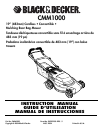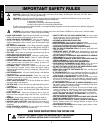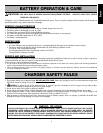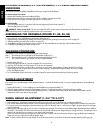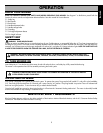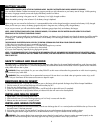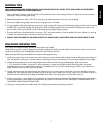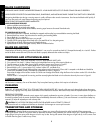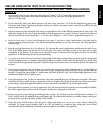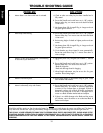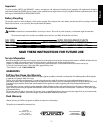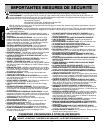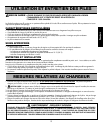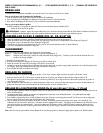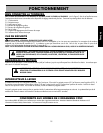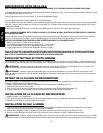
7
ENGLISH
MOWING TIPS
NOTE: ALWAYS INSPECT AREA WHERE MOWER IS TO BE USED AND REMOVE ALL STONES, STICKS, WIRE, BONES AND OTHER DEBRIS
WHICH MIGHT BE THROWN BY THE ROTATING BLADE.
1. Mow across the face of slopes, never up-and-down. Exercise extreme caution when changing direction on slopes. Do not mow excessively
steep slopes. Always maintain good footing.
2. Release bail handle to turn mower “OFF” when crossing any graveled area (stones can be thrown by the blade).
3. Set mower at highest cutting height when mowing in rough ground or in tall weed.
4. If a grass catcher is used during the fast growing season, the grass may tend to clog up at the discharge opening. Ensure the mower system is
switched “OFF” and remove the safety key. Remove the catcher and shake the grass down to the back end of the bag. Also clean out any
grass or debris which may be packed around the discharge opening. Replace the grass catcher.
5. If mower should start to vibrate abnormally, turn mower “OFF” and remove safety key. Check immediately for cause. Vibration is a warning
of trouble. Do not operate mower until a service check has been made.
6. ALWAYS TURN THE MOWER OFF AND REMOVE SAFETY KEY WHEN LEAVING IT UNATTENDED EVEN FOR A SHORT PERIOD OF TIME.
MULCHING MOWING TIPS
Your mower was shipped from Black & Decker with the mulch insert installed.
While mulching, your new mower is designed to cut the grass clippings into small pieces and distribute them back into the lawn. Under normal
conditions, the mulched grass will biodegrade quickly to provide nutrients to the lawn.
Please review the following recommendations for optimum mulching performance.
1. Avoid mowing when the grass is wet from rain or dew. Wet grass may form clumps which interfere with the mulching action and reduce run-
time. The best time to mow grass is in the late afternoon when the grass is dry and the newly cut area will not be exposed to direct sunlight.
2. For best mulching performance, set the cutting height to remove about one third of the grass blade length, ideally no more than
1-1/2” at one time. If the lawn is overgrown, it may be necessary to increase the cut height to reduce the pushing effort and prevent
overloading the motor. For extremely heavy mulching, it is advisable to first cut at a high cut height setting, and then re-cut to the final cut
height. Otherwise, make narrower cuts and mow slowly.
3. For best performance, keep the mower housing free of built-up grass. From time to time turn off mower and wait for the blade to come to a
complete stop. Then unplug the safety key and turn mower on its side. Using an object such as a stick, wipe out any accumulation of grass in
the blade area. Be careful of the sharp edges of the blade. Clean often in wet, spring grass, and always after every use.
4. Certain types of grass or grass conditions may require that an area be mulched a second time to fully disperse the grass throughout the lawn.
If cutting a second time, it is advisable to cut perpendicular (across) the first cut pattern. DO NOT CHANGE CUT PATTERN IN ANY WAY
THAT WOULD CAUSE MOWING DOWN A HILL.
5. Change your cutting pattern from week to week. This will help prevent matting and graining of the lawn.



